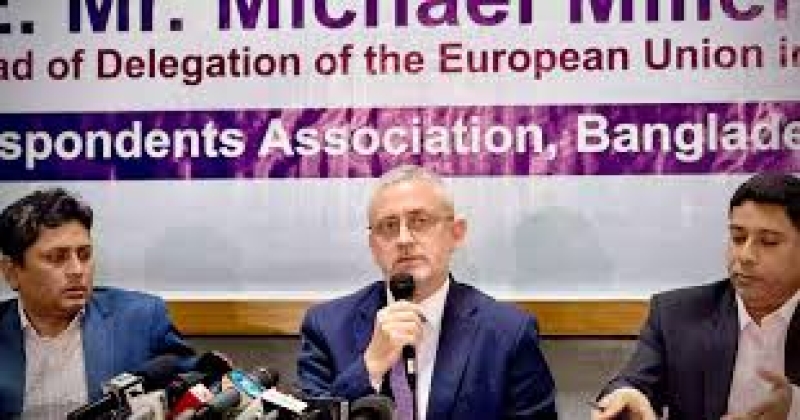- Young woman dies as scarf wrapped with auto wheel at Aftabnagar |
- Dams in Chenab Basin and Climate Change: Need to Exercise Caution |
- Dr. Yunus for body to ensure fair price of animals, rawhides |
- Bus workers go on indefinite strike in Bhola |
- CA Urges Formation of Body to Ensure Fair Rawhide Prices |
Bangladesh to Decide Election Timing: Envoy Miller

Reiterating its support for the delivery of an ambitious reform agenda in Bangladesh, Ambassador and Head of Delegation of the European Union Michael Miller on Monday said the election timing is an issue for Bangladesh to decide and they are not pressuring on anyone to hold the election on a particular date.
“I have to say it is a matter for Bangladesh to take a decision on. We see this political transition as leading up to the democratic election….from the EU we don’t have any opinion on time, we are not pressuring anyone to hold election on a particular date,” he said while responding to a question at the “DCAB Talk” held at Jatiya Press Club.
Diplomatic Correspondents Association, Bangladesh (DCAB) hosted the event where DCAB President AKM Moinuddin and General Secretary Md Arifuzzaman Mamun also spoke.
Ambassador Miller said they are waiting for political parties and the interim government to agree on “very clearly prioritised and specific list of reforms” and noted that they do have experience which is helpful and financing which can support. And we have the political will to stand with you.”
Chief Adviser Prof Muhammad Yunus has recently said the people of Bangladesh think that the interim government is still the “good answer” for them but stressed that they will not go beyond June 2026 to hold the best election ever in the country.
Prof Yunus, who is also Chairman of the National Consensus Commission, stressed the urgency of accelerating reform efforts to ensure that the national election is held between December this year and June 2026.
Ambassador Miller said they think there needs to be sufficient time to implement the reforms under this interim government.
Based on deaths reported by various credible sources, the UN report estimated that as many as 1,400 people may have been killed between 1 July and 15 August, and thousands were injured, the vast majority of whom were shot by Bangladesh’s security forces.
Responding to a question, the EU Ambassador said they support the work of the UN fact-finding mission and laid emphasis on accountability for those “terrible crimes” perpetrated against the people during the July Uprising.
Highlighting the importance of Bangladesh’s judicial authorities’ evidence-based work, Ambassador Miller hoped that Bangladesh will deal with the terrible crimes perpetrated against its people.
“There must be accountability. There must be transparent and fair process and the rights of every single person should be respected through due process,” he added.
Ambassador Miller said the interim government had inherited “very great number of challenges”, including on security, economy, financial fronts and rebuilding confidence takes time.
Talking about women’s rights, the EU envoy said equality between men and women is the core value in Europe and it is a core universal value.
He said the work of the Women’s Affairs Reform Commission should be examined extremely carefully and they support all efforts that ensure equality between men and women.
“The report and the recommendations of the Women’s Affairs Reform Commission are extremely important. We consider equality between men and women as core value of the EU,” said Ambassador Miller.
He said the recommendations of the Commission should be looked at “extremely carefully and closely” by political parties because they would like to see those recommendations translated into actions. “We will contribute towards greater equality.”
In response to a question on the Rohingya issue, Ambassador Miller said unfortunately this is a crisis that goes on despite the best efforts of Bangladesh and partners like the European Union.
“There are enormous efforts being made by Bangladesh,” he said, adding that there is violence on the other side of the border.
“We are indeed trying very hard to support a political solution which is the only solution to this crisis,” said Ambassador Miller.
“I have to say, we have many conversations with the Bangladesh authorities, those conversations always concluded with a common understanding that return can only be in a safe, dignified, and voluntary manner,” he added.
As a humanitarian partner for Bangladesh, Ambassador Miller said they are quite happy to be pragmatic on how they can meet the needs of the refugees.
The European Union has maintained a consistent level of support over the past seven years. In 2025, the European Union has already allocated over EUR 32 million to support the Rohingya refugees and their Bangladeshi host communities. These funds are provided via the Joint Response Plan, which we are launching today.
The European Union also supports Rohingya refugees who have fled to other countries in the region, as well as the Rohingya who remain in Myanmar. Our total support for the Rohingya since 2017 equals nearly 1 billion EUR provided together by the EU and its Member States, reports UNB.

